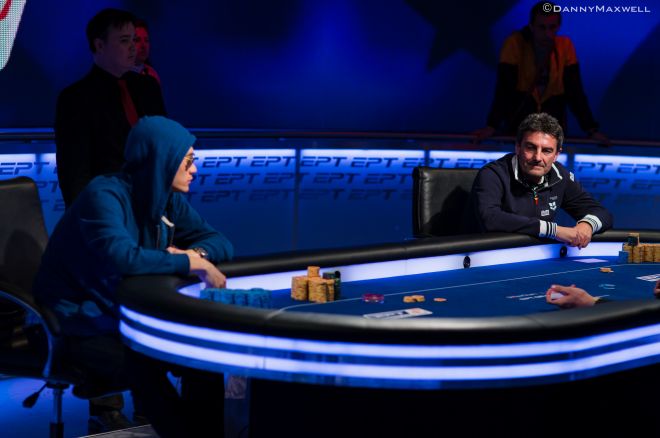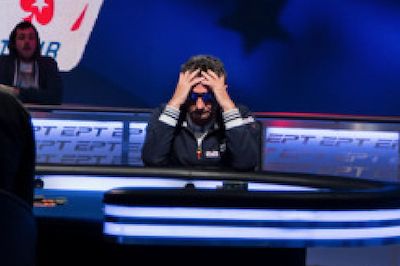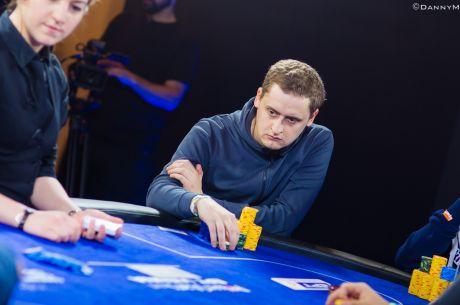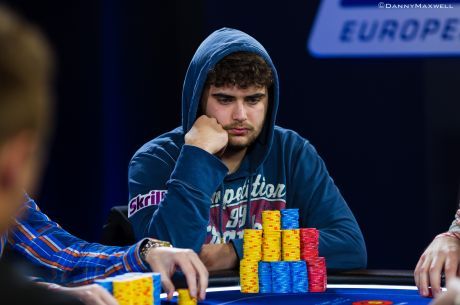Thinking Poker: One Heads-Up Hand, Five Valuable Lessons

The European Poker Tour heads to Malta later this month for a first-ever visit to the island country, then next month will conclude another season in Monaco with the Grand Final. If you recall, last year��s Grand Final was punctuated by a marathon final table lasting over 15 hours, the final eight hours of which were taken up by an epic heads-up battle between Jack Salter and Antonio Buonanno.
In an era when observers complain of robotic experts showering pots with reraise after reraise, the Salter-Buonanno match was a disciplined, deliberate grind full of emotion. Salter put both his heads-up experience and his British wit on display, while the Italian Buonanno stuck to a patient, thoughtful game even when Salter accumulated a big chip lead.
One hand in particular characterized the match, Hand #251 of the final table. Salter and Buonanno had already been playing heads-up for over seven-and-a-half hours by then, and when the hand began Buonanno had opened a slight lead on Salter after the latter had been in front for most of their duel.
The blinds were 125,000/250,000 with a 30,000 ante. Salter opened the button for 525,000 with 9?4?, and Buonanno called out of the big blind with K?9?.
The flop came 10?8?6?. Buonanno checked, Salter bet 445,000 into the pot of about 1.1 million, and Buonanno called. The K? on the turn then gave Buonanno top pair. He checked, Salter bet 1.275 million, and Buonanno called. The river brought the 9?, giving Buonanno two pair and Salter third pair. Buonanno responded by setting Salter in for his last 5 million, which was a slight overbet.
A six-minute tank ensued. Both Salter and Buonanno spent much of the time grabbing their foreheads and grimacing, though for different reasons. Eventually Salter folded. At the time on the live stream the EPTLive commentators accused Salter of taking time when he had no real decision. However, when looking back at the hand I am inclined to think Salter legitimately had considered calling.
We ought to both enjoy the drama of the hand and learn what we can from it. In fact, there are at least five different lessons that we can draw from this single hand:
1. There��s a difference between bluffing with no hand and bluffing with no equity.
Salter, in my view, chose a good hand for his aggressive play. In heads-up play one must sometimes try to win pots without a hand �� the real question is which hands to bluff with. One ought to consider many things when making this decision, but when doing so it is important to remember the distinction between having showdown value and having equity.
Here Salter has nine-high before the flop, which will almost never win at showdown unimproved; however, sometimes he will make a straight, which is a powerful hand. On the flop and turn he still has no showdown hand, but he does have equity. If you can represent enough strong hands, this sort of hand is often a good bluffing candidate. When you bluff, you either create a larger pot or you win the pot immediately. Having no showdown hand means that the latter outcome is particularly good; having equity means that the first outcome isn��t hopeless.

2. Sometimes bluff-catchers are all the same.
I suspect that Salter considered calling because he figured that Buonanno would be scared by the coordinated board into checking with all but his best hands �� unless, that is, he was bluffing. If that is the case, his pair of nines would be roughly as strong as A?A? or better in this situation: both can beat bluffs and neither can beat Buonanno��s value bets. For that reason, although 9?4? looks �� and is! �� weak in an absolute sense on that board, it sometimes functions fine as a bluff-catcher.
3. More often, bluff-catchers aren��t all the same.
However common it is to employ ��nuts or nothing�� reasoning as in (2) above, be careful when you��re tempted to think this way. People bet for many reasons, and they will sometimes surprise you. Moreover, as you improve your game and come to face tougher opponents, you will need to worry about establishing good, balanced frequencies for your various actions. That task requires you think not of a huge ��bluff-catcher�� bucket but rather of a continuum of hands along which 9?4? has some relative position. Knowing which are your best bluff-catchers and which are your worst bluff-catchers will often guide you to a correct decision.
4. Sometimes people bet because they don��t want to face a bet.
I can��t know exactly why Buonanno bet in that situation, but I��ve faced a lot of bets similar to the one Buonanno made (if not with half a million euros on the line). Frequently I have seen people make such bets because they think they have a winner but hate the idea of facing a big bet on a wet board. If Buonanno had checked and Salter had made a large bet, Buonanno would have rightly feared that Salter held a 7x for a one-card straight. (After all, Salter was betting with a gutshot �� it was just the other gutshot!)
It is not always wrong to bet in these situations, but people do frequently make these bets for a bad reason: because they want to avoid an uncomfortable situation. It is psychologically similar to the reason why many players try to get all in with strong draws (another play that is only sometimes good). Betting with a good hand has an easy justification. Making the wrong choice on a later street might feel much more like a ��fish play.�� Keep this mental pattern in mind: it explains a surprising number of plays that you��ll see.

5. Sometimes poker hurts.
There is much to recommend about Buonanno��s ultimately championship-winning play at that final table, but in my view Salter put on a clinic. He timed his aggression well, valued his hands properly, and with few exceptions displayed excellent fundamentals.
That wasn��t enough to secure a victory, however. Once they got heads-up, Salter didn��t win any all-in confrontations, and Buonanno made many other strong hands at inconvenient times for Salter. The wonderful sense of control you feel when you��re playing well has limits, and those limits are far more modest than many of us would like to believe. The excitement and intellectual challenge of poker are inseparable from those features of poker that leave us grabbing at our foreheads.
Be sure to check out Nate and Andrew Brokos on the Thinking Poker podcast, and for more from Nate visit his blog at natemeyvis.com.
Get all the latest PokerNews updates on your social media outlets. Follow us on Twitter and find us on both Facebook and Google+!








